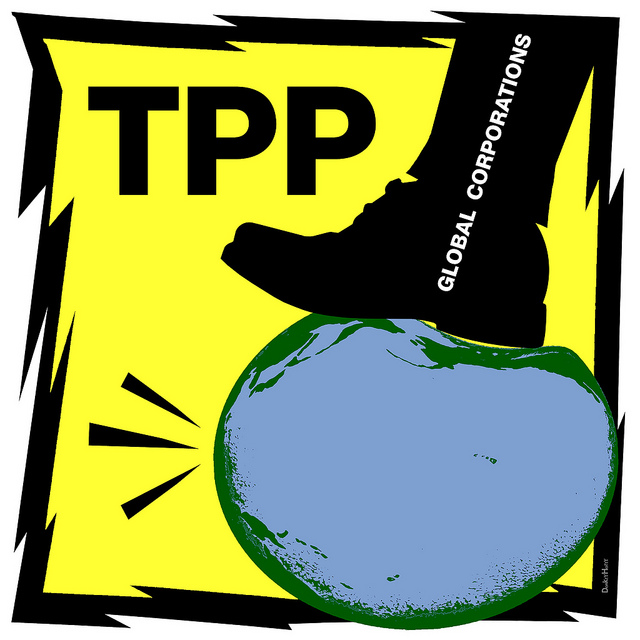You can change the conversation. Chip in to rabble’s donation drive today!
Wikileaks has again pierced through the cloak of secrecy protecting ongoing U.S.-led Trans-Pacific Partnership trade negotiations, to which Canada is one of 12 participating countries. In November, they released the controversial intellectual property rights chapter showing country positions on patents, copyright, trademarks and Internet rules. Yesterday, Wikileaks published (and dismissed as nearly useless) a November 24 version of the TPP’s Environment chapter.
“When compared against other TPP chapters, the Environment Chapter is noteworthy for its absence of mandated clauses or meaningful enforcement measures,” says a Wikileaks media release. “The dispute settlement mechanisms it creates are cooperative instead of binding; there are no required penalties and no proposed criminal sanctions. With the exception of fisheries, trade in ‘environmental’ goods and the disputed inclusion of other multilateral agreements, the Chapter appears to function as a public relations exercise.”
A report from negotiating chairs about the consolidated text, also leaked, says the chapter attempts “to balance the need for ambitious obligations in a trade agreement to protect and conserve the environment with the keen interest from some Parties to include substantive commitments to cooperate on specific topics. On this issue, the consolidated text sets out ambitious obligations while providing for flexibility and cooperation where helpful to assist Parties in implementing these obligations.”
A bit too much flexibility, probably. In many ways, the approach to environmental protection in the TPP, based on this leak, would mirror weak commitments and almost non-existent enforcement options in NAFTA’s environmental side agreement. A Commission for Environmental Cooperation established under NAFTA to monitor and police its environmental commitments has been powerless to stop the weakening of environmental legislation in Canada as part of Harper’s efforts to attract investment in oil, gas and mining projects.
Of all TPP negotiating countries, only the U.S. is prepared to subject environmental disputes to the “same arbitral tribunal process as the obligations found elsewhere in the TPP,” says the report. “This includes the resort to the application of trade sanctions in cases where compliance with an arbitral panel ruling is not achieved.” Canada has pushed back successfully against similar European requests to included multilateral environmental agreements in the Sustainable Development chapter of the Canada-EU Comprehensive Economic and Trade Agreement (CETA).
Jane Kelsey, a trade and investment expert and professor at Auckland University, has analyzed the leaked Environment Chapter for Wikileaks. She writes:
Instead of a 21st century standard of protection, the leaked text shows that the obligations are weak and compliance with them is unenforceable. Contrast that to other chapters that subordinate the environment, natural resources and indigenous rights to commercial objectives and business interests. The corporate agenda wins both ways.
Those chapters include one on investment protection, with an investor-to-state dispute settlement process pulled from NAFTA that gives companies extraordinary rights to challenge environmental measures that undermine their profits. Governments will have no comparable powers in the TPP to make sure multinational corporations are abiding by environmental commitments (e.g. to remediate industrial sites). In fact, the TPP environment chapter encourages voluntary mechanisms to enhance environmental performance (section 9) and voluntary corporate social responsibility programs (section 8).
All of this just exposes the obvious: the TPP is not an environmental protection agreement but another, much more elaborate compact for policing corporate globalization. Governments are prohibited from interfering with trade and investment flows. When they or their corporations disrupt ecosystems or continue to dump carbon into the atmosphere their only punishment is a lengthy consultation.
The Council of Canadians is one of more than 30 organizations participating in a January 31 Intercontinental Day of Action against the TPP and Corporate Globalization. For more information, or to volunteer to plan an action in your community, visit www.tinyurl.com/tradejustice.
Like this article? Chip in to keep stories like these coming!
Image: DonkeyHotey/flickr



